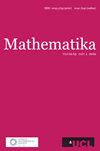模形式的局部符号分布和傅里叶系数的杂音
IF 0.8
3区 数学
Q2 MATHEMATICS
引用次数: 0
摘要
最近,我们证明了模形式的全局根数偏向于。与Pharis一起,我们还显示了傅里叶系数对根数符号的初始偏差。首先,我们证明了关于局部根数的类似结果。其次,最近在椭圆曲线和模形式中发现了傅里叶系数和全局根数之间的微妙关联,称为杂音。我们在更一般的情况下推测局部根数的不同(可能是空的)组合的杂音。最后,附录更正了我们与Pharis联合论文中的一个符号错误。本文章由计算机程序翻译,如有差异,请以英文原文为准。
Distribution of local signs of modular forms and murmurations of Fourier coefficients
Recently, we showed that global root numbers of modular forms are biased toward . Together with Pharis, we also showed an initial bias of Fourier coefficients toward the sign of the root number. First, we prove analogous results with respect to local root numbers. Second, a subtle correlation between Fourier coefficients and global root numbers, termed murmurations, was recently discovered for elliptic curves and modular forms. We conjecture murmurations in a more general context of different (possibly empty) combinations of local root numbers. Last, the Appendix corrects a sign error in our joint paper with Pharis.
求助全文
通过发布文献求助,成功后即可免费获取论文全文。
去求助
来源期刊

Mathematika
MATHEMATICS, APPLIED-MATHEMATICS
CiteScore
1.40
自引率
0.00%
发文量
60
审稿时长
>12 weeks
期刊介绍:
Mathematika publishes both pure and applied mathematical articles and has done so continuously since its founding by Harold Davenport in the 1950s. The traditional emphasis has been towards the purer side of mathematics but applied mathematics and articles addressing both aspects are equally welcome. The journal is published by the London Mathematical Society, on behalf of its owner University College London, and will continue to publish research papers of the highest mathematical quality.
 求助内容:
求助内容: 应助结果提醒方式:
应助结果提醒方式:


